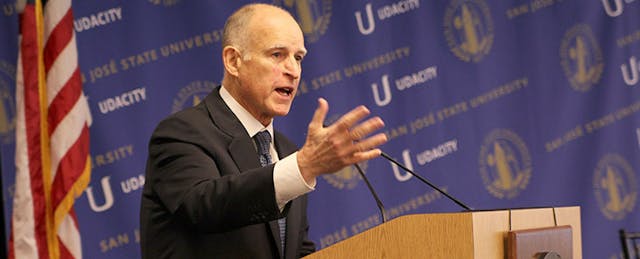Higher ed may be changing for real this year. Today startup Udacity and the California State University system announced they would jointly pilot classes specifically to provide students with a completely online class experience-a first for MOOCs and university professors. The program, which will launch at San Jose State University, will offer the classes for $150 apiece and will start this month.
The initial classes, which will include a remedial algebra course, college-level algebra and introduction to statistics, will be limited to 300 students in total (100 per class), half from SJSU and half from nearby community colleges and high schools. The National Science Foundation is providing funds to study the effectiveness of the new online classes.
California Governor Jerry Brown got the ball rolling with Udacity by dialing up Thrun to talk about the state's higher-ed crisis. The problems for community colleges are manifold: over the past decade, tuition has almost tripled. Leaders at San Jose State University, moreover, note that more than half the school's incoming freshman can't pass elementary math and English placement tests--forcing them and the school to embark on costly remediation programs. Finally, only about 48% of the students who start at SJSU achieve a degree.
The move follows the recent 20 Million Minds forum on alleviating California's higher ed crisis (which included Udacity's Thrun).
"We hope that the $150 sticker will change higher Ed," Thrun told EdSurge.
Among the challenges for Udacity: bolstering the anemic 10 percent retention rate that typical MOOCs have generally seen so far. They plan to fight this by offering 24/7 help from Udacity mentors. To help prevent cheating, Udacity plans to use the testing and authentication service, ProctorU (We covered ProctorU's talks with Coursera here).
At the Tuesday press conference, neither Brown nor Thrun would disclose how much Udacity will earn for offering the classes. "Whatever it costs, it'll be cheaper than a high speed rail," Brown quipped. San Jose State has contributed $45,000 to help develop the three courses--most of which will go to the five professors who have worked with Udacity to develop the programs. SJSU Provost and VP for Academic Affairs, Ellen Junn elaborated, "With only 300 students, we're operating in the red, that's why we're looking for outside funding."
Thrun, a former professor from Stanford, was eager to diffuse concerns from faculty. "MOOCs are not a viable model for education--we need professors to help," he said at the press conference.
Even so, reactions from university professors will likely be mixed. Cathy Davidson (@CathyNDavidson), cofounder of Duke University's HASTAC program and a widely known commentator on digital media, says she's been ending most of her talks these days with a dystopic slide: "IF WE PROFS CAN BE REPLACED BY A COMPUTER SCREEN, WE SHOULD BE.”
She hastens to add that she thinks people have a lot to offer--but that university professors need to do more to articulate and demonstrate how they're helping students achieve their education goals.
Adds Davidson:
"Making that case accurately and persuasively (to the public, to legislators, to donors, and mostly to our students) is the single most important thing any professor can do because, if we don’t, it will be made for us. And we won't like the result."
Editor's note: with updates from press conference


